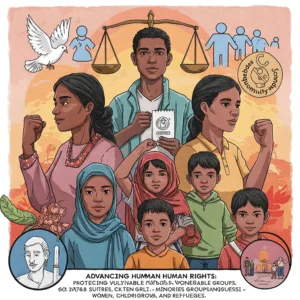
Growth requests Change
The concept of the custody of a child only occurs when the parents have separated, one or both parents
are dead, or the child is facing harm where they live, or the parents cannot for whatever reason take care
of their child.
The Personal Laws in this country govern the majority of issues on the matters of Family, including
Marriage, adoption, inheritance, divorce, guardianship, and to a certain extent Custody Laws.

Marriage Laws and Custody.
Custody: It is the legal term for having the physical and legal rights over a person and in the case of a
child, a child’s custody more or less refers to who their guardian is or who holds the guardianship of a
child.
Hindu Laws: After a Marriage is Solemnised according to Hindu law, and when a child is born, that
child belongs to both parents equally, both the mother and father have the right to take care of the child
and look towards a better future development of the budding young person.
According to Hindu law, a natural guardian for a minor is the child’s father, a guardian is a person who
looks after the minor or his property or both, he also takes upon the complete legal protection of this
child as laid down by Sec 19 of the Guardians and Wards Act, 1890. This provision’s strength has come
down over the years because of different judicial decisions and by sec 13 of the Hindu Minority and
Guardianship Act, which states that the welfare of a minor is of paramount consideration, and a father’s
right to guardianship falls below the right of a child’s welfare.
That if the father fails to function as a guardian the mother will do so. She will also be the guardian
when the parents are separated and the children are younger than 5 years according to Sec 6 of the
Hindu Minority and Guardianship Act, this will also be under the condition that it is good for the welfare
of the child if it is proven so otherwise then the guardianship may be taken away from her, but that
doesn’t mean she will never be granted guardianship of her child again.
Any Child born to parents who are not married or are in a live-in relationship, then the guardian of that
child is the mother, she will not lose guardianship of her children even if she converts to another religion
or marriage or remarriage with a person from another faith.
Natural parents will always have guardianship over relations of the parents, if both the parents and
nearest relations are unable to care or unfit to care for the child, the child will go over to the testamentary
guardians appointed by the parents.

If the father dies then the mother or vice versa
Father appointed testamentary guardian if he has died 1st and mother has made no changes
Mother appointed testamentary guardian if she dies after the father
There is no form of joint testamentary guardianship.
A Child can choose with whom they want to live following age 9. Any boy over the age of 16 and a girl
over the age of 14 cannot be compelled to live with whom they don’t desire to live with.
The husband is the natural guardian of the minor wife, but the interest in the welfare of the minor wife
is 1st seen. This has been changed concerning the Prohibition of Child Marriage Act, An Adult Male
who marries a minor wife will not gain guardianship over her.
Muslim Law and guardianship
Guardianship of the person of the minor for custody (Hizanat).
In Muslim law, this has to be studied concerning the degree of relationship between the persons and
their age.
A mother is the de facto guardian of the child, under the Hanafi School of Law she gets the custody of
her boy child until he has completed 7 years and her girl child until she attains puberty, in the Shia
School of Law she has custody of her boy child till he is 2 years ago and the girl till she is 7 years
old.
She retains custody of her children even when she is divorced but only until she marries another, then
the custody of the children belongs to the father.

Under Hanafi Law, if the mother is not able to take care of her children, then the custody goes to
Grandmothers- Maternal then Paternal (However high)
Sisters through different methods
Sister’s children through different methods
Aunts – Maternal then Paternal through different methods
In default of the mother and female relations not being able to take care of the child then the custody
goes to:
Father
Paternal Grandfather (nearest)
Brother through different methods
Brothers Son through different methods
Uncles through different methods
Uncles Son through different methods
No male is supposed to be the guardian of an Unmarried Girl Child unless he is within prohibited
degrees of relationship. If no one else then the court can appoint a guardian.
Under Shia law mother has the custody of her children, if she passes away the guardianship goes to the
children’s father, failing the father, it is the Paternal Grandfather, and no more degree of relation is
further defined.
The husband doesn’t have custody of the Minor wife unless she has attained Puberty, and the mother has
custody of the Minor Married Girl over her Husband.
If the child is born not from Marriage, then until 7 years they are in the custody of the mother, and later
on they can decide of their own volition which of their parents they want to live with or have the option
to live apart from them altogether.
All decisions taken in consideration of the minor’s custody will be taken only with the minor’s welfare
in mind.

A child after the age of 9 can choose which of their parents they want to live with past age 9.
Under all other laws, the courts can decide who they consider the best for the child to live with, taking
into consideration mainly the welfare of the child and secondly the preference of the child.
Different ways of custody
Physical Custody: one parent is granted physical custody of the child i.e., the child lives with them, and
the other parent has visitation rights along with the right to take legal decisions on behalf of the child.
Joint custody: both parents have equal custody of their children, both physical and legal. They are also
allowed to have visitation rights.
Third-party custody: this type of custody is granted to a third party most likely relations of the parents
because both parents are deemed unfit.
Sole custody: the full custody of the child is granted to one parent only, especially because the nature
of the other parent was abusive and or they don’t pose any value for the child in their upbringing.
Dynamic Child Custody
As seen above matters of child custody is to be seen with great care to the children being put through a
the whole ordeal of watching their parents go through what may be a permanent separation.
A child’s welfare is at the top of the minds of all judges when granting custody of a child to a parent, a
the parent will have to satisfy a no. of conditions to be able to gain custody of their child.
A minor child is continuously growing, and growth brings about different changes in a person this is
especially visible in matters of children.

Therefore, keeping them locked up in an area where, when they have the means and opportunity to
Growing bigger is simply untenable.
Justice Neela Gokhale (Bombay HC) said that matters of child custody are sensitive and need to be seen
with a lens of care and affection for the child in their growth. She said that custody orders are not rigid
and can be altered keeping in mind the welfare of the child. “Therefore, custody orders are always
considered as interlocutory orders and cannot be made rigid and final.”
The High Court also noted that while the welfare of the child is seen (which is subject to change), the
rights of parents also need to be considered, and if a parent is considered fit enough to take care of the
child and a child’s future welfare rests with a change in custody then it needs to be considered and
granted. This applies also in cases where the wishes of the child were considered, those orders too can
be varied for the welfare of the child.







